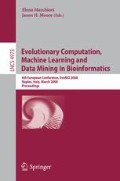Abstract
An important goal of human genetics is to identify DNA sequence variations that are predictive of susceptibility to common human diseases. This is a classification problem with data consisting of discrete attributes and a binary outcome. A variety of different machine learning methods based on artificial evolution have been developed and applied to modeling the relationship between genotype and phenotype. While artificial evolution approaches show promise, they are far from perfect and are only loosely based on real biological and evolutionary processes. It has recently been suggested that a new paradigm is needed where “artificial evolution” is transformed to “computational evolution” (CE) by incorporating more biological and evolutionary complexity into existing algorithms. It has been proposed that CE systems will be more likely to solve problems of interest to biologists and biomedical researchers. The goal of the present study was to develop and evaluate a prototype CE system for the analysis of human genetics data. We describe here this new open-ended CE system and provide initial results from a simulation study that suggests more complex operators result in better solutions.
Access this chapter
Tax calculation will be finalised at checkout
Purchases are for personal use only
Preview
Unable to display preview. Download preview PDF.
References
Bateson, W.: Mendel’s Principles of Heredity. Cambridge University Press, Cambridge (1909)
Moore, J.H.: The ubiquitous nature of epistasis in determining susceptibility to common human diseases. Human Heredity 56, 73–82 (2003)
Moore, J.H., Williams, S.W.: Traversing the conceptual divide between biological and statistical epistasis: Systems biology and a more modern synthesis. BioEssays 27, 637–646 (2005)
Thornton-Wells, T.A., Moore, J.H., Haines, J.L.: Genetics, statistics and human disease: Analytical retooling for complexity. Trends in Genetics 20, 640–647 (2004)
Freitas, A.: Understanding the crucial role of attribute interactions. Artificial Intelligence Review 16, 177–199 (2001)
Li, W., Reich, J.: A complete enumeration and classification of two-locus disease models. Human Heredity 50, 334–349 (2000)
Lucek, P.R., Ott, J.: Neural network analysis of complex traits. Genetic Epidemiology 14, 1101–1106 (1997)
Ritchie, M.D., Hahn, L.W., Roodi, N., Bailey, L.R., Dupont, W.D., Parl, F.F., Moore, J.H.: Multifactor dimensionality reduction reveals high-order interactions among estrogen metabolism genes in sporadic breast cancer. American Journal of Human Genetics 69, 138–147 (2001)
Moore, J.H., White, B.C.: Genome-wide genetic analysis using genetic programming: The critical need for expert knowledge. In: Riolo, R.L., Soule, T., Worzel, B. (eds.) Genetic Programming Theory and Practice IV. Genetic and Evolutionary Computation, vol. 5, Springer, Heidelberg (2006)
Moore, J.H., White, B.C.: Exploiting expert knowledge in genetic programming for genome-wide genetic analysis. In: Runarsson, T.P., Beyer, H.-G., Burke, E.K., Merelo-Guervós, J.J., Whitley, L.D., Yao, X. (eds.) PPSN 2006. LNCS, vol. 4193, pp. 969–977. Springer, Heidelberg (2006)
Moore, J.H., Barney, N., Tsai, C.T., Chiang, F.T., Gui, J., White, B.C.: Symbolic modeling of epistasis. Human Heredity 63(2), 120–133 (2007)
Koza, J.R.: Genetic Programming: On the Programming of Computers by Means of Natural Selection. MIT Press, Cambridge (1992)
Koza, J.R.: Genetic Programming II: Automatic Discovery of Reusable Programs. MIT Press, Cambridge Massachusetts (1994)
Koza, J.R., Andre, D., Bennett, I.F.H., Keane, M.: Genetic Programming 3: Darwinian Invention and Problem Solving. Morgan Kaufmann, San Francisco (1999)
Koza, J.R., Keane, M.A., Streeter, M.J., Mydlowec, W., Yu, J., Lanza, G.: Genetic Programming IV: Routine Human-Competitive Machine Intelligence. Kluwer Academic Publishers, Dordrecht (2003)
Banzhaf, W., Nordin, P., Keller, R.E., Francone, F.D.: Genetic Programming – An Introduction. In: On the Automatic Evolution of Computer Programs and its Applications. Morgan Kaufmann, San Francisco (January, 1998)
Langdon, W.B.: Genetic Programming and Data Structures: Genetic Programming + Data Structures = Automatic Programming!, Genetic Programming, vol. 1. Kluwer, Boston (April 24, 1998)
Langdon, W.B., Poli, R.: Foundations of Genetic Programming. Springer, Heidelberg (2002)
Freitas, A.: Data Mining and Knowledge Discovery with Evolutionary Algorithms. Springer, Heidelberg (2002)
Fogel, G.B., Corne, D.W.: Evolutionary Computation in Bioinformatics. Kaufmann Publishers, San Francisco (2003)
Yu, T., Riolo, R.L., Worzel, B. (eds.): Genetic Programming Theory and Practice III. Genetic Programming, vol. 9. Ann Arbor, Springer, Heidelberg (May 12–14, 2005)
Banzhaf, W., Beslon, G., Christensen, S., Foster, J.A., Kepes, F., Lefort, V., Miller, J., Radman, M., Ramsden, J.J.: From artificial evolution to computational evolution: a research agenda. Nature Reviews Genetics 7, 729–735 (2006)
Moore, J.H., Parker, J.S., Hahn, L.W.: Symbolic discriminant analysis for mining gene expression patterns. In: Flach, P.A., De Raedt, L. (eds.) ECML 2001. LNCS (LNAI), vol. 2167, pp. 191–205. Springer, Heidelberg (2001)
Folino, G., Pizzuti, C., Spezzano, G.: A cellular genetic programming approach to classification. In: Proceedings of the Genetic and Evolutionary Computation Conference (GECCO 1999), pp. 1015–1020 (1999)
Greene, C.S., White, B.C., Moore, J.H.: An expert knowledge-guided mutation operator for genome-wide genetic analysis using genetic programming, vol. 4774, pp. 30–40 (2007)
Goldberg, D.E.: The Design of Innovation. Kluwer Academic Publishers, Dordrecht (2002)
Sempere, L.F., Cole, C.N., McPeek, M.A., Peterson, K.J.: The phylogenetic distribution of metazoan micrornas: insights into evolutionary complexity and constraint. Journal of Experimental Zoology 306, 575–575 (2006)
Author information
Authors and Affiliations
Editor information
Rights and permissions
Copyright information
© 2008 Springer-Verlag Berlin Heidelberg
About this paper
Cite this paper
Moore, J.H., Andrews, P.C., Barney, N., White, B.C. (2008). Development and Evaluation of an Open-Ended Computational Evolution System for the Genetic Analysis of Susceptibility to Common Human Diseases. In: Marchiori, E., Moore, J.H. (eds) Evolutionary Computation, Machine Learning and Data Mining in Bioinformatics. EvoBIO 2008. Lecture Notes in Computer Science, vol 4973. Springer, Berlin, Heidelberg. https://doi.org/10.1007/978-3-540-78757-0_12
Download citation
DOI: https://doi.org/10.1007/978-3-540-78757-0_12
Publisher Name: Springer, Berlin, Heidelberg
Print ISBN: 978-3-540-78756-3
Online ISBN: 978-3-540-78757-0
eBook Packages: Computer ScienceComputer Science (R0)

